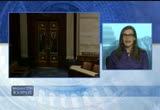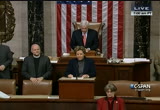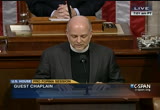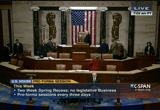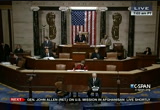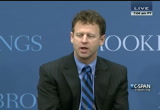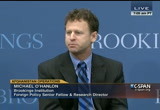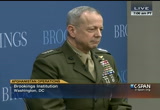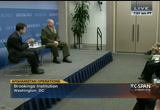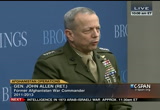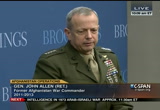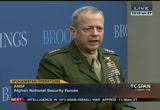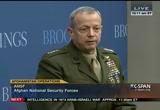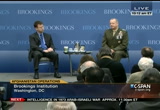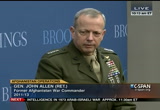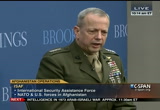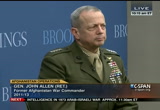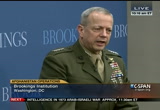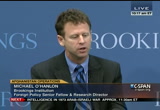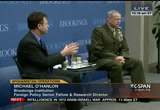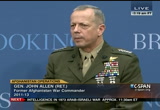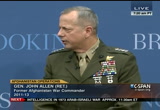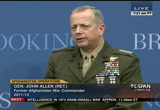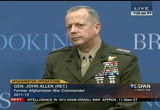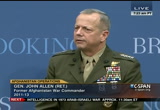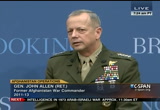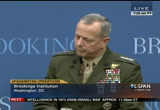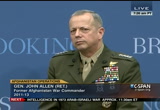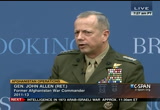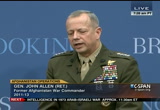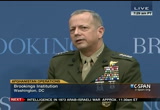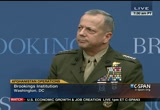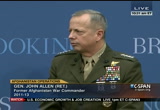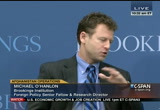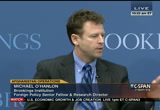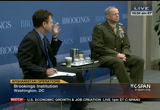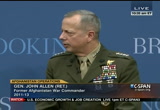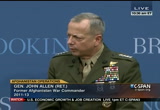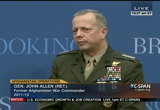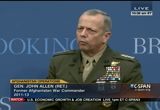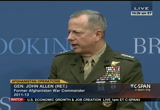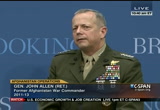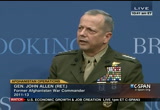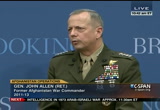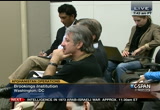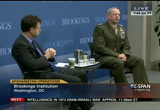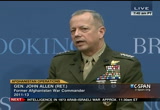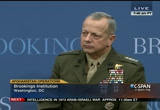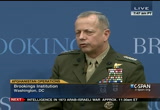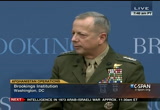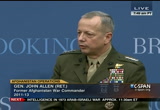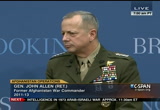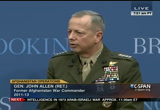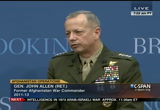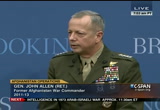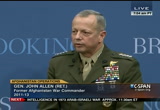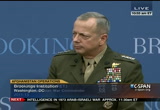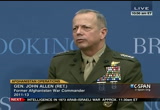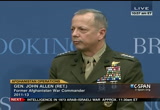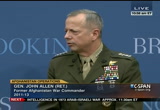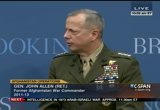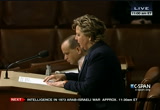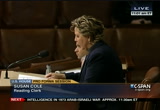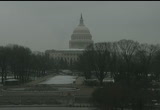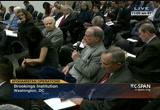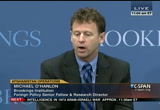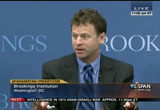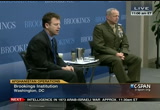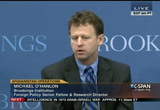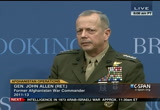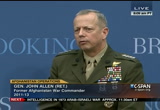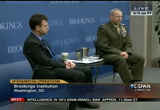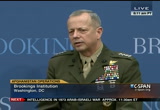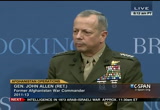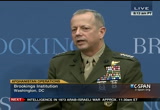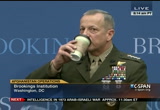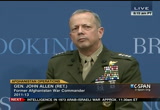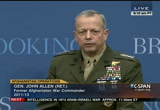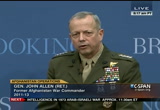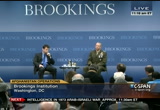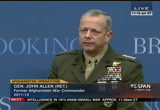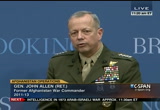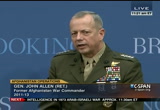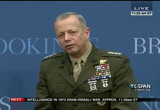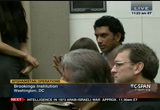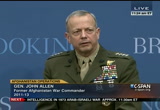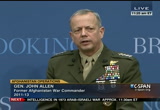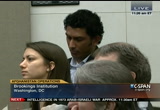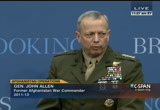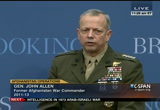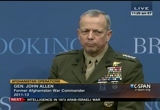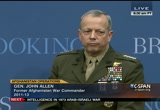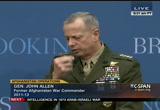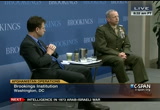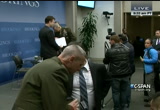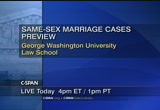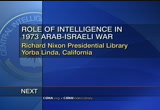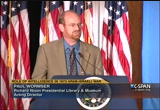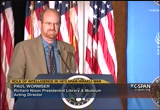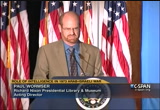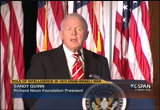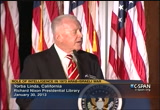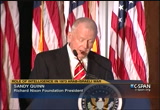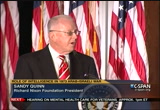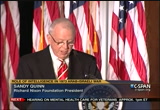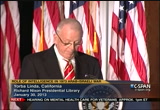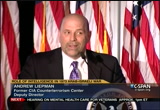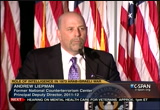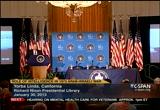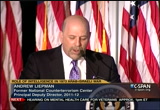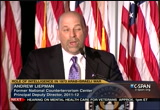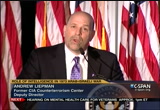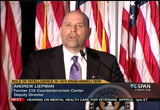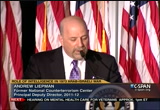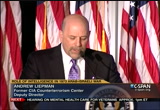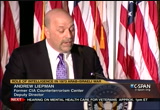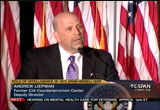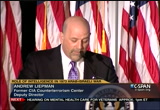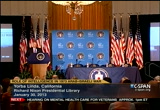tv Politics Public Policy Today CSPAN March 25, 2013 10:00am-12:00pm EDT
10:00 am
we'll look at same-sex marriage cases tomorrow. [captioning performed by national captioning institute] [captions copyright national cable satellite corp. 2013] i hereby appoint the honorable frank r. wolf to act as speaker pro tempore on this day. signed, john a. boehner, speaker of the house of representatives. the speaker pro tempore: the prayer will be offered by the guest chaplain, reverend orrin
10:01 am
warder, st. paul's episcopal church, alexandria, virginia. the chaplain: let us pray. blessed are you god of the universe, you have created us and given us life. blessed are you god of this earth. you have set our world like a radiant jewel in the heavens and filled it with beauty and hope. blessed are you god of these united states of america, for all the lessons of our past, for all that remains for us to do. blessed are you god of truth and justice, guide the men and women of this house of representatives. grant them insight, courage, compassion, and imagination. protect them from corruption and arrogance. and grant that we whom they seek to serve may give them the support that they need.
10:02 am
increase our trust in one another. strengthen our quest for justice. and bring us to unity and a common purpose. blessed are you god of the universe and blessed are we your people. aamen. the speaker pro tempore: pursuant to section 2-a of house resolution 122, the journal of the last day's proceedings is approved. the chair will lead the house in the pledge of allegiance. i pledge allegiance to the flag of the united states of america and to the republic for which it stands, one nation under god, indivisible, with liberty and justice for all. the chair lays before the house a communication. the clerk: the honorable the speaker, house of
10:03 am
representatives, sir. pursuant to the permission granted in clause 2-h of rule 2 of the rules of the u.s. house of representatives, the clerk received the following message from the secretary of the senate on march 22, 2013, at 11:28 a.m. that the senate agreed to without amendment, house concurrent resolution 18, house concurrent resolution 19. that the senate passed senate 540. appointments, u.s.-china interparliamentry group, mexico-u.s. parliamentry group, canada-u.s. interparliamentry group, british-american interparliamentry group. signed, sincerely, karen l. haas. the speaker pro tempore: pursuant to clause 12-a of rule 1, the house will stand >> we are live at the brookings institution for remarks from general john allen.
10:04 am
will talk about his time in the command. this is just getting underway live here on the c-span. >> good morning everyone. i am michael o'hanlon. we are honored to wait to have general john allen with us, t forhe commandf of security assistance from calf -- the former commander of security assistance from afghanistan. i am good at asking to join me in welcoming general allen and thank him for our service. when the histories of this period are written as they
10:05 am
already are, general john allen be one of the most important generals. he was a 1976 graduate of annapolis. he had his career over many different assignments. one of them that was most notable, he was an architect -- an architect of the modern industry -- he was then rewarded for his accomplishment and for many other things he has done in his career by being the first marine to the superintendent at the naval academy in annapolis. i think if you -- i think you that appreciate military culture. you will recognize the kind of special person that was needed to be available before the baby was never comfortable with a marina -- with a marina
10:06 am
running annapolis. that rkening began in egion and the united states learned how to control it and give it patraeus was in command. crucial efforta and the suny awakening. he went to central command where he spent three years as the deputy commanding general. iraq,sly overseeing afghanistan, iran, and other key parts of the world. he was asked by the president to assume command in afghanistan and to relieve general topatraeus -- to relieve general david patraeus in july 2011. he had to up the effort and intensity on the fight well
10:07 am
beginning the major downsizing of u.s. forces. he began with 100,000 american troops and wound up with about 68,000. he had to do that through exciting season last year. seasonugh a fighting last year. we're glad to talk about the campaign and the conditions in afghanistan today. he and i will speak for maybe half an hour. and then we'll look forward to you and your participation. before we do all that, on behalf of all of the troops and tens of thousands of americans and others that he commanded who we want to thank, and especially to thank him for his service, please join me in giving a round of applause to general john allen tweet. [laughter] [applause] thank you very much.
10:08 am
>> i know we are not going to have a lot of happy talk today. there are a lot of things happening in afghanistan. people are unaware of the positives that happened on your watch. without ignoring the-, which we will certainly be factoring into the discussion, i am wondering if we can begin by talking about two or three of the biggest positive developments aesop under your watch. >> i think the coherence of the organization from where i found it when i arrived in the summer of 2011 to where it is today has really been dramatic. it has been delivered to this point because of the hard work of an awful lot of folks. they did great work in that area. bill called well, i am working very closely with him. --bill caldwell, i am w orking very closely with him.
10:09 am
one of my first priorities when i gave my introductory remarks an hour after i took command was one of the principal priorities that we are going to have to face over the next couple of years was to move the ansf into the lead. get them pick to get to -- to get them to the lead we had to build on the organizational capacity, build on the capacity of its leadership, work resolutely to create the support establishment necessary to sustain the ansf. the afghan military academy is soon to be the officers' school , which has been called " sandhurst in the sand.
10:10 am
under those were construction at the time. thehas given the ansf capacity to move from entering -- to move from an infantry force. the capacity of the schools to build the specialty field we need within the ansf with that regard -- we are beginning to see significant work remaining for the build out of the nsf. we are still filling a significant amount of the force, although it is mostly recruited. some areas such as logistics, transportation, engineering, disposal, aviation, crewman ship, all of those things are beginning to emerge as viable occupational specialties, something we could not have imagined 20 months ago. we were really just getting into the business of building
10:11 am
specialties within the asnf. another possibility has been the literacy training. it was implemented by dave petreaus. inis carried out afghanistan. the concept of giving the be literatecity to and capitalize on the program trading environment which the soldiers and police entering the service -- to give them some capacity initially to read and write and to make their numbers at first grade level -- havey over half of the asnf the capacity to read in the first grade level.
10:12 am
to continue to emphasize the continued learning of the afghan soldiers and police threw up a period of time of their enlistment. this becomes not just an initiative which is useful for military and police operations, it is an initiative that has the potential to change society in many suspects -- in many respects. this has the potential for some pretty dramatic change. >> across the country i think there were other important outcomes of where we found the asnf in 2011 to where we are today. the securing of large segments of the population -- you wrote about it with michelle in a very
10:13 am
good piece with respect to what you discovered. i travel inis when my battlefield circulation during the final months in afghanistan i tended to visit more of the afghan forces that our forces. i wanted to see how they were doing, how their command in control is coming on line, how they're asking their operations and missions -- how they were executing their operations admissions. the price they have paid to liberate substantial segments of the population has resulted in opportunities to embed health care, health care access, getting school under way, protecting schools in reallyties, that has
10:14 am
enhance the capacity of the civil population to benefit directly from the activities of the ansf. as they have become more bigger, more professional, better in the battle space -- there are some early indicators of how the ansf has integrated. it is professionally developed and professionally trained. it has the capacity for coherent planning commission execution -- coherent planning, mission execution, this force becomes more proficient as we feel the entire force as it works its way through the 2013 fighting forces advised by isef that we get some indication of the long term how the civil society can get access to this opportunities.
10:15 am
some significant advantages to the afghan people. the numbers vary from conversation to conversation. when 8 million to 9 million afghan children are in school today and 40% of them are young woman, that is a dramatic change. if i encountered one thing throughout my circulation in the battle space or around afghanistan, it was the enthusiasm of this new generation of afghans for their education. they saw that it wasn't just the key to employment, they saw it was a key to the future of afghanistan. i thought that was very positive and ferry much an indicator of the sense of this new generation of afghans who see the future of afghanistan very much about afghanistan and or tribal ethnicity
10:16 am
orientation. to that extent i did spend time with the schools. one of the schools in particular i spent a lot of time with in kabul. which thechool in youngsters -- unsponsored them with scholarships. these youngsters saw their future tied to their own professions. she wanted to be a doctor, he wanted to be a lawyer, she wanted to be an engineer. they saw their future as tied to afghanistan and not to a job and not to necessarily their tribe or ethnicity. i think where we have come from in the middle of 2011 to where we are today in so many ways with development of the ansf and the capacity to operate in the field, this has been a real benefit to afghanistan as a
10:17 am
state in afghanistan as a people. was theo emphasize it result of a lot of hard work of our predecessors. all should have recognized of the nato allies you commanded. i think you had a 48 nation coalition in addition -- and 50 asian coalition. i want to come back in a moment to the specifics of the afghan security forces that you were describing. it encompasses about a half of the organization. i am sure we look into that in a little bit. for those who are skeptical of this mission, we know a lot of americans are. a lot of americans are tired of it. you have the right to be more tired of it than the rest of us. it is dubious that we can really be successful. is haveanted to do next you may be tellus a story of
10:18 am
where we are in the where -- maybe tell us a story of where we are in the war compared to where we want to be. during the crystal review at think it is fair to say that people hope things will turn around more quickly, that the andiban can be weakened the afghan government can be made less corrupt. we will come back to the specifics. you couldering if tell us a big picture story. we frustrated by where the war was when you arrived? were you still fundamentally frustrated with where it was when you left? did you feel that there was a generally positive narrative, even in big picture terms. you mentioned some specific encouraging signs with the afghan army and the population's commitment to the country. when you put the whole thing together do you still believe in the mission?
10:19 am
do you think we are being relatively successful and have a decent prospect for at least a modest level of success in the >> end greater than the short answer to that is yes. one of the comments made earlier about fatigue is that those of us who have been closest to the mission or perhaps those of us to believe in it the most, i am not fatigued by it. i was tired every now and again. i wasn't fatigued by it. as i was coming out of the mission i felt far more optimistic about what success might look like. largely because i think in some anyways we were beginning to see ansf by the end of '12. we began to see them ultimately take shape in 2013 and 2014 to
10:20 am
give us reason for hope. understand, the capacity for political development, economic development, those kinds of indicators in a campaign like this will typically lag the security achievements and security, bushmans'. -- and the security accomplishments. each of us would of like to have seen greater capacity in that regard. i was confident that over time we could achieve levels of capacity. not during the period of now to 2014, but during after that. capability over the long term to build the capacity
10:21 am
and economic opportunity necessary for afghanistan to achieve stability. in the short term, but we just put it in operational terms -- let me just put it in operational terms what happened in 2012 which has helped us set the conditions for 2013. the year that sets the stage for the accomplishments of 2014, how we anticipate seeing that unfold. 2012 we did a number of things. it was a momentous here in that regard. the first thing was to recover the phase 2 of the surge. the first phase was 10,000. the second phase was to recover the remaining 23,000 and into -- 23,000 and to do so by september.
10:22 am
second come operationally as strategically we but doing an operation -- we were conducting a battle hand over from high staff conventional forces which were in for combat operations to the ansf. they were coming online in the 6 corps areas for conducting a battle handover. the ansf were moving intot he lead and we were moving into a brigade and core level operations were increasingly the rule of thumb. they increasingly are today. my staff forces were converting. they made the decision to begin to convert my combat formations
10:23 am
to advisory formations. we had envisioned -- we had envisioned the unfolding of the campaign, there would come a time when leawood transition from being the primary force -- being the primary force in contact with the enemy. we would be in an advisory role. at the very moment we are moving th ansf, we are converting our forces from main force combat units to security force assistance units. we are recovering, we are shifting in a battle handover from the forces being in the the to the ansf being in lead. we are doing that well closing 500 facilities. we were closing facilities throughout the country as our
10:24 am
forces were beginning to retrograde, as our forces were beginning to leave the theater. we are transferring basis to the afghans as quickly as it could budde and a very programmed way -- as quickly as we could but in a very programmed way. we did all of that in contact with the enemy. -- battle hadr never, recover 23,000 troops, shift from the asnf from support to the lead, substantially reconfigure our forces and hand -- our forces and repopulate them. the same timet at within the same space. very clearly begin to
10:25 am
move to the lead and we felt comfortable with it. at the same time we had to deal with such things as the urination video, we had to deal with the corps on burning -- the koran burning, we had to deal with insider threats and insider attacks. ith the context of 20112, was truly a momentous year. as we begin to transfer our force to an advisory force and ultimately force that would shrink over time, a diminishing proximity across the country. >> that is the condition for 2013? are intur formations advisory configurationsarehe -- all their formations are an
10:26 am
advisory configurations. fully intoing to be the fghtingfor season 2013. reconfigured the force to be within a close relationship with the ansf. theur numbers come down relationship will change. it will change from being pervasive across aboutto ultimately of arriving at the core level advisory posture. people continue to close bases. we have 180 still today out of the original 800. we will continue to close the bases as our numbers to mission is to our numbers diminish.
10:27 am
close the bases as our numbers diminish. of the the recovery 23,000 troops in the summer of 2012 provided us an opportunity itoo accelerate the ansf the lead. they turned out to be better than we thought. we think that was a key realization for us in that regard. >> another couple of points and you cut me off if i am going to long. the afghan local police was an entity that was becoming into its own at that time. there are lots of anecdotal stories. i can assure you that in the context of how we have worked with the afghans closely to
10:28 am
raise and deploy and train and support t alp that it is an institutional force at this point. as the alp became more pervasive, tit became a crown holding force for the purposes of the campaign. it was the terrain-denial force. it denied the most important to rein in many areas of afghanistan, the human terrain. alp was coming on line. it is well over 20,000, the original deal that was agreed to buy the president and afghans. the intent is to move 45,000 over time. we are strong and secure the resources for that right now. --an organizational level our main force units -- and very
10:29 am
important initiative occurred that in some cases might have been missed. it was the creation of something called the special operations joint task force. this is the first time in u.s. history and probably coalition history where we have formed under a two-star edition sides operation -- under a two-star division sized operation program. point, those three tries came together for the very first time organizationally in my office. they all answer a vertically to me. we achieve, but the creation of --, a far greater
10:30 am
,ntegration of our forces elements that were responsible for the training of the commandos. to better integrate them as an organization. we were able to lead the way for the afghans as their special operations forces emerged to be very effective to lead the way in creating even better effectiveness from the afghan special operations committee and begin to set the stage for their integration into afghan plans as well. 2012 was a big year. 2012 set the conditions for 2013. 2013 will be the year that the afghans move into the lead fully for their campaign. in 2013 set the
10:31 am
conditions ultimately for 2014. and in 2014, the two really big events -- one of them is perhaps the most important event in the election.paign, the april 5, 2014. we can talk about what role isaf will have in that. they will provide unprecedented and unparalleled security to this election. isaf's numbers draw down, setting the conditions for the enduring presence force, nato is when the college resolute, setting the conditions will the terms of the capabilities and locations of the platform so that force can be ready to go
10:32 am
on the first of january 2013, fully integrated with the afghans in terms of the advisory relationship they will have. 2013 is the year to set the conditions for 2014. 2014 will be the year return and eight i -- will be the year where we terminate the isaf mission. >> i would ask those of you who like to speak to bring up some of the other central issues such as our relationship with president carter side. karzai.president this is a two part question building on what you just said. i would like asking a simple down-to-earth basic question, do the afghan party -- to the afghan army and police fight? the strategy is very well
10:33 am
constructed and you have had a lot of success with it. i am sure it also has a theoretical feel. are the afghan soldiers and police can develop and willing to fight for their country? the second part is liking to this broader campaign. it is on the same issue. i think it is fair to say that while you have had enough forces to do a lot you did not have enough forces that they had of originally envisioned -- than they had originally envisioned. and he worked together and he decided on the next phase of the plan was to cut our forces by half of the next year. this lost certain parts of the east in particular.
10:34 am
are those parts of eastern afghanistan in particular, where you did not have the forces to go out and clear out taliban sanctuaries, weapons caches, the local police, the other forces that could hold forces after nato forces had cleared. can the afghans do that now? is the remaining job of clearing parts of the east a bridge too far for them or is it really within their capacity? if it is not within their capacity can live with that? can we live within afghanistan where there is constant insurgent sanctuaries. do they fight? that is a gut instinct and gut feel for what you saw. and the second part is in terms of the broader campaign plan, for those areas that we did not
10:35 am
get too, can they do it themselves? >> let me hit the second one first. the east is going to be a challenge for a long time for afghanistan. sometimes this comes as a surprise when i say this that on the first of january they are still when the fighting in 2015. endedct the mission has and resolute support is under way as an advisory mission, they still are gone to be fighting. afghanistan will join a long and distinguished list of countries that will be struggling in a post-conflict environment where it will have an insurgency in some parts of that country for an extended period of time. there will be an insurgency in afghanistan at some point. the question is not whether there is a presence of an insurgency, it is whether it is
10:36 am
a substantial -- whether it is existential. as my time as gone on and professional development and capacity of the ansf intinue to improve, think we could have that over -- to dominate that critical, physical, and he meant to rein that both provides a platform for continued operations over the long term, the capacity in the context we heard. the layer defense as it has been
10:37 am
developed it to radically in the last couple of years and as it will be implemented practically aertime, i think it provides lot of promise as the afghans continue to build capacity as we see developments east of the border to hold over time. without spending a lot of time on the concept itself, starting from the bottom-up it is with starting from the bottom up, it is where the afghan police have been sighted. the afghan national police will be leading the alp at a district level. it is the integration of pleased across the board from border
10:38 am
police through the afghan national police to the local police and supported by afghan civil order police at times, which are organized in several brigades here. in the east those brigades are engaged in combat operations. but police units, which are oriented on increasingly -- on law enforcement, in counterinsurgency will be will be supported by the afghan national army. the four south of kabul has grown dramatically, both in capacity and numbers, adding brigades and units and capacity over the last 18 months. commandingcommander the big red one has been magnificent in bringing the along to builds
10:39 am
capacity to be able to fight credibly. we have this organic layering of police elements that will be supported by the maneuver elements of the police, which in turn will be supported by the afghan national army which is being cited in key locations to conduct operations against the red light's coming out of pakistan, the potential safe havens, and they afghanistan, and support areas. and they're supported by afghan commandos. and increasingly you will see the fielding of the mobil site -- of the mobile strike force battalions. five in the northeast. armoredhighly mobile units that will give the afghans the capable -- the capability to
10:40 am
move to keep aerospace is. -- two key battle spaces. if i had a map like to lay this out for you in a way that would give you a sense that in the east, while it would have been useful to have conventional forces for isaf to conduct for their operations, we just did not have the time or forces. over time as the mobile strike force vehicles, online, as the afghans layer their defensive, i'll have more confidence that they have the ability to control the security situation in the east. it is a tough question and one that is not able to be rendered into an easy answer. the east will be the challenge.
10:41 am
it is with the pakistani border. the nature of the sanctuaries and safe havens within pakistan, whether they are pressured or destructive of the time, all of those issues over time will effect the security situation in the east. in the meantime, if the security situation doesn't substantially return in favor of the long-term outcome, if they are not pressured or there is no form of reconciliation, i believe that over the long term the layered defense index offers us the greatest potential and dominate the human and physical terrain way that toul in a defend the capital. it is a complicated answer but i hope i could have printed it in some respects. -- could have rendered it in some respect.
10:42 am
effectiveness of individual units is really your question. i have seldom seen occasions where the first man in the stack there arehan unit, good chances the first man is going to have a pretty tough time. as is the case with any american unit. the effectiveness is typically defined by the commander. there is an old saying in our forces, "no unit can be better than the inherent weaknesses of its commander." by extension its commander officers and ceos -- by its officers and c.o.'s we have been in good partnership with the minister at mod and moi. both of whom have got to the
10:43 am
president and received permission to conduct extensive leadership screening. person has begun to fire and remove a number of commanders who are either incompetent or are homesteaders or they are correct -- they are correupt. the bulls lead by example and lead from the front spiritually. and they lead competently. we are still suffering at the middle ranks of the afghan military. many of these commanders, who were very capable jihadi fighters, they fought the taliban during the civil war, ==
10:44 am
we have got work to do. there has been an increase in the last several months in the army. the afghans are getting after that. in their view, much of the problems is associated with leadership and conditions under which the troops are living. to their credit they are working hard to go after those attrition numbers. they are very closely examining the environment which the afghan troops are living. i do not have any concerns about the afghans fighting. the individual afghan is a very brave persopoliceman or soldier. the issue is can we produce leadership and coherent staff capabilities that can focus and
10:45 am
take advantage of this inherent martial spirit that we find in the afghan individuals and produce coherent fighting units out of that. that is the challenge. we have a lot of work to do to build the professionalism of the afghan army. they are enthusiastic about it. this is a very new army. in many respects, euphemistically, we are building this plane while it is in flight. troops go from the training ground to the battleground. beenof these troops have fighting constantly frontiers. -- constantly for years. there are demands and sacrifices made by these forces as they are coming on line that we would find challenging ourselves if we had to deal with it. police arees and fighters. the challenge is whether leadership will be able to ultimately lead them. that is a major objective of where we are today.
10:46 am
>> fascinating answer. let us go to the crowd. if you could wait for a microphone and then identify yourself -- try to limit yourself to one question. >> one question in six parts. [laughter] >> read appear in the front row. -- right up here in the front row. >> a lot of us were with secretary hagel on the last trip to afghanistan where karzai made hs remarks about pollution between nato forces and the taliban. he believed his assertions of sovereignty could threaten the strategy that you and others have laid out? what would you say the american people would have concerns about what kind of part the u.s. have with presidnet karzai? >> is a complex answer.
10:47 am
i have known the president for some period of time. let me talk about my own relationship with him because it is in that context i hear his comments. and i have known him since early 2009 but got to know him very well from the time i took command in mid-2011. , he has therase hardest job on the planet. with the number of years he has been in place and the things he has had to deal with on a regular basis, he does have a difficult mission. he does have a typical set of challenges on any given day on virtually all issues. domestic balance constituency, both tribal and ethnic.
10:48 am
he has to balance rhetoric with the potential for peace. he has to balance what he says with regard to his regional neighbors. all of that goes into the pot in terms of what he says and how he says it and when he says it and where he says it. when i was in afghanistan my mother passed away and i did not tell anybody. i did not want anybody to focus on that. eventually i had a chance to come home and lay my mother to rest. afterwards family -- we were having dinner. the palacel that wanted to talk to me. i thought this was not good. i went outside and took the call and it was president karzai.
10:49 am
asked why didn't tell him. i said, " he mr. president, you carry the weight of the world on your shoulders. i did not want at your burdens. familiesur mothers and are precious to us and even though he just learned about it he wanted me to have his condolences. he did not have to do that. , herelationship that we had called me to offer his best did not see said we eye to eye on a lot of things. but he said, " you did what you believe was best for your country and i have tried to do the best that i believe i can do for my country." , he had tos context balance a lot of things in the
10:50 am
palace, in kabul, and across the country in what he says. often those remarks are intended to draw the distinction between him as the leader of afghanistan and those who have supported him from the international community for some period of time. he does appear to be a sovereign and independent leader seeking to move the country from a post-conflict country to a developing society. we do not have to agree with it. we do not have to condone it. we do not have to like it. occasions where i have been publicly confronted in testimony with some of his rhetoric, i have in fact rejected comments which would put our troops at risk and put his troops at risk. and if in fact the president truly does believe that the u.s. is colluding with it caliban --
10:51 am
with the taliban, i am here to tell you i would know and lee ain't. that, mr. you believe president? what is it that causes you to believe that to the extent that he would say it publicly with the risk of not only alienating the united states but alienating your own population. the people of afghanistan -- i spent a lot of time amongst the people. fore they may be ready foreign forces to go home they do in fact have strong views bout america and international forces. they recognize that sooner or later the foreign forces will go home. i do not believe they are anti- foreign or anti-american.
10:52 am
the first thing i would say to the american people is the afghan people are deeply appreciative of the sacrifices the international community has made for them. they understand what has been done. during ramadan last year i would typically gives to the families of afghans and who lost sons fighting -- there was an afghan father to me and i gave him is a cot and offered him my pervert -- offered him my prayer support. "with this death of my four sons, i am ready to give them all for the cause >' the afghan people are very
10:53 am
knowledgeable about what we have done in that country, what we have done with them, thus shared sacrifice we have made, what we have done for them, and i can also tell you that president karzai understands that as well. he has offered his acknowledgement. i try to keep in context the rhetoric. i try to understand why he would say the things that he says. on those occasions where things like collusion with the taliban to maintain an unstable security environment for our perpetual presence, i would say that is not correct. i would be very happy to see what proved would lead him to make those kinds of comments -- what proof would lead him to make those kinds of comments. on those occasions with
10:54 am
urination video, which prompted first shootings of advisers, with the tragic burning of the with the materials, insider attacks, the strength of our relationship and his commitment to the outcome, his commitment to the campaign was such that these events were absorbed by the strength of the relationship. they did not become event that broke the relationship. we are going to have rocky moments. there are going to be words that are spoken -- we do not have to like them and we can even contend them. the reality is he is the democratically elected president of a nation that we are seeking to make a sovereign state with the blood of our young men and women. there will be occasions where we do not get along and there will be occasions where we will be
10:55 am
openly antagonistic towards each other. on the whole the relationship is strong. the relationship is resilient. i believe the relationship is sufficiently strong foundation only that it will deliver the campaign to the end of 2014 successfully. >> i just want to ask the follow-up on the issue of insider attacks. we talked about it before. i know a lot of americans have it on their mind if you could just mentioned two or three things that were most important that you put into effect over the last 19 months that will continue to reduce it, which is thankfully down in recent months by at least half. cuddy's a couple of words on that subject? >> this may have been one of the great strategic risks of the campaign. the talent and are not going to the fetus for the afghans militarily. -- the taliban are not going to
10:56 am
defeat us or the afghans militarily. it threatened the national will of the elements within the coalition. i have said publicly before that we are willing to their great sacrifice on behalf of this campaign -- to bear great sacrifice on behalf of this campaign. as this threat became more apparent, and it has been going on for some time, but in the summer of 2012 became both numerically and tragically a prominent dimension of political and campaign landscape. tolook very hard this understand what we had in front of us. testify or leave to
10:57 am
visit brussels i would stop in capitals of key troop contributing nations. i was in berlin when i got the phone call that four french advisers had just been shot and killed by an afghan soldier. later we were to learn that he had not seen but learned -- but heard of the video and pulled the trigger based on that. i was getting ready to fly from berlin to paris, where as i got off the airplane i was handed a newspaper by the attache and there was an article in " the national tribune," that said in essence the difficulty we had with afghanistan was cultural and irreconcilable. i am writing in paris the
10:58 am
morning of the tragedy -- i am arriving in paris the morning of that tragedy and it would appear the literature is being defined by this being an irreconcilable social issue. neither of which were particularly comfortable spots to be in. we spent a lot of time trying to understand what is at work here with insider threats. i rejected the sole explanation that this was cultural from the beginning. i had been an adviser in other places. i served in countries all around the world, some of the developing with the cultures were very different. occasionnever any where based on solely cultural differences the reasons were sufficient to kill the advisers or kill the foreign forces. it was more than that. as time went on we began to
10:59 am
listen to the chatter amongst the taliban that gby attacking the advisory forces they sought both inte a crisis terms of whether they can separate as among the seem -- if they could separate us along the seam of where the advisers were close to the afghans by forcing us to change our operational posture with respect to how we deploy our advisers, it would have the effect of striking a blow to the coalition. it would also have the effect of diminishing to training and capacity building of the afghans. commander, very early on to determine that this was an enemy threat. by challenging it as an enemy threat we were able to take a boat tour here it set of measures -- take a more coherent
11:00 am
set of measures to treat it as a cultural issue with only cultural training as prescribed outcome. prescribed outcome. so, we swam upstream and looked at training from the moment someone arrived in a unit. -- >> we're going to leave this discussion now to go live to the u.s. house. members are in session this morning. the speaker pro tempore: pursuant to clause 4 of rule 1, the following enrolled bill was signed by the speaker on hursday, march 21, 2013. the clerk: h.r. 993, making consolidating appropriations for further continuing appropriations for the fiscal year ending september 30, 2013, and for other purposes. the speaker pro tempore: the chair lays before the house a privileged concurrent resolution. the clerk: senate concurrent resolution 11, resolved, that
11:01 am
when the senate recesses or adjourns on any day from friday, march 22, 2013, through tuesday, march 26, 2013, on a motion offered pursuant to this concurrent resolution by its majority leader or his designee, it stand recessed or adjourned until 12:00 noon on monday, april 8, 2013, or such other time on that day as may be sessfide by the majority leader or his designee and the motion to recess or adjourn or until the time of any reassembly pursuant to section 2 of this concurrent resolution which ever occurs first. and that when the house adjourns on monday, march 25, 2013, on a motion offered pursuant to this concurrent resolution by its majority leader or his designee, it stand adjourned until 2:00 p.m. on tuesday, april 9, 2013, or until the time of any reassembly pursuant to section 2 of this concurrent resolution which ever occurs first. section 2, the majority leader
11:02 am
of the senate and the speaker of the house or their respective designees acting jointly after consultation with the minority leader of the senate and the minority leader of the house shall notify the members of the senate and house he respectively to reassemble at such place and time as they may designate in their opinion the public interest shall warrant it. the speaker pro tempore: without objection, the concurrent resolution is agreed to. the motion to reconsider is laid upon the table. without objection, pursuant to senate concurrent resolution 11, the 113th congress, the house stands adjourned until 2:00 p.m. on tuesday, april 9, >> at the house was scheduled
11:03 am
to deal with a number of pro forma items. they did deal with the need to return to the pro forma sessions. the house will be back in session on tuesday, april 9 and we'll have live coverage here on c-span. we will go back to the brookings institution now for more remarks from general john allen. he is talking about his time in command. >> he was very worried the enabling forces that would stay behind are simply not going to be there in sufficient numbers. curiously, this conclusion is quite optimistic. if we were prepared to keep support and military troops -- given the crises likely to arise in iran and syria, the elections in pakistan, it seems to be our appetite for a long-
11:04 am
term presence in afghanistan with sufficient resources is certainly not going to be very great. case,t proves to be the and i agree with tony's conclusion, it is there a plan? >> i had a very good trip with tony. there were a lot of good recommendations and specific observations and i share his concerns. thequestion is whether united states does turn largely on how well the afghans do in their election next year and who replaces president karzai and whether it be successor is seen as serious. we have to figure out ways to use our influence to increase the likelihood of those kind of outcome is without having to choose the candidate or choose the preferred winner.
11:05 am
thing --very specific the afghan machinery for watching elections, they did a pretty good job in the last two elections because they're the ones who found the fraud. i say that as a former international observer. we did not find it, the afghans on it. it's crucial those organizations stay independent. one of the things we have to do is support afghans in parliament and elsewhere who want to have a say for those commissions. a temptation to stack them with people who support them. i don't want to suggest his motives are unfortunate, but afghanistan's constitutional which is partly are doing put too much power in hands of the
11:06 am
president and general. the mayors of every town in that country, it's unbelievable. with all due respect to the american to do great work in afghanistan in great -- a decade ago, we botched it, and that's one of the things that have to figure out how to amend it. a short-term consequence is these commissions need to be populated by people who are seen as representing all of afghanistan and not one particular interest. not just in voting but the campaign to see the media cover all the different candidates and all the allegations of impropriety are back. those are the kinds of things we have to focus on in the next year. to avoid talking ourselves out of our own staying power. we americans are tired of this war but we are also pretty resilient.
11:07 am
this is 12 years and we are still at it. we use when to a presidential race for the countries that we are tired of this war. neither gov. romney nor president obama to their mutual credit talked about accelerating the drop down just to get the heck out. we went through all of 2012 with no major speech by the president or governor romney about how we should hurry up our departure. if you look at our history, whether it's with the middle east, korea, taiwan, we spent decades supporting young democracy that were not always doing that well anomalies that impressive. we recognized we had security interests. it took south korea for decades to get to the point of a legitimate election and we stood by them all time. if we have our security interests engaged in seat
11:08 am
gradual progress and the partner countries, we americans are capable of doing what i consider the right thing in sticking with it. into not talk ourselves doing something for our long term interest before we even try. >> i agree with all that mike has said. the point made other post- conflict societies where we have had a long-term presence, because of the staying power, we toe these societies emerge be the global example of democracy or the ability to develop an economy. butn't go into specifics, there are a couple of points i would make. as is always the case in a case like this, the ability to conduct government reforms is
11:09 am
difficult. it is hard. this is a new and the creek -- and increasingly assertive legislature. they are boisterous, aggressive, and assertive. all of those things are positive with respect to where they seek to go in afghanistan. . is is a young democracy it is early. the good news is in ways that other countries we have been involved with overtime, first, afghanistan sits on top of trillions of dollars of natural resources. expands a wide spot -- it stands a wide spectrum from rare earth to strategic minerals to gems and gold. just a vast, vast wealth. the next bit of great wealth to
11:10 am
develop isn't the mining industry, it needs to develop its human capital. from a poste thelict environment where national leadership chose to invest in the youth. there are countries around the world and people can take them off quickly with as early strategic decisions to develop the use of the country have delivered relatively small countries with a great capacity over time. koryak as an example. the very important point in the question of whether there is an affordability to -- and affordability dimension, we don't need to have the kinds of forces in south korea to preserve security for decades that we need to have in
11:11 am
afghanistan. that afghan forces will be fully billed at the end of the year. they will have had to full fighting seasons under the belt before we ship to the long-term enduring presence and advisory mission. there's very little likelihood that afghanistan sits in an environment where, unlike in korea, there could be a resurgence of a north korean invasion helped by communist superpowers. the kind of international presence back to support the security environment would be difficult in afghanistan. it would be tailored it closely to developing the professionalism of the force and the capacity of the force. well, governance, reform, fighting corruption, the economic capacity of the country, those will lag. we should expect that they will. the good news is as we found in
11:12 am
may of last year in chicago, the is nato and its 22 partners are willing to contribute over time to the security environment and forces of the afghans. i don't think a decision has been announced, but there is clear consideration that the afghan security forces should remain at that number for some number of years after our mission is over. signal of commitment which is good for the afghan people, good for the security environment of the country. it givesemains intact, the next administration time to get its legs up from under it and pursue an agenda of reform, countering corruption. it gives the economy time to move into equilibrium after years and years of distortion of
11:13 am
wartime spending. that is a signal not just to the afghan people, it's a signal to the taliban that this force which is getting more capable will be there for years. it is a signal to pakistan, who if it is very concerned about the outcome in afghanistan, it can give them greater confidence to pursue strategies that augur well for the security of afghanistan, which is secure afghanistan is vital to the long term security of pakistan. are dramatic and many, but we should not be surprised that there will be substantial political reform that will lead to golan after 2014. that administration will receive the support of the international community. chicago was important and tokyo was even more important, the
11:14 am
long term investment of $16 million by 70 donor nations and organizations. all that augurs well for the future. none of that can occur if there is not a secure environment. that's essential for the remaining 21 months of this campaign, to do all we can to shape the insurgency and then to be organized in post 2014 with the kinds of forces to provide the advice, training, an advisory capacity to continue the upward spiral of professional development within which the white space purchased through the security forces, we can see the fourth movement of government reform, embracing the rule of law and the developing of economic capacity. >> let's go over here. >> i am from the "los angeles times." the general began by asking for positive indicators and you spoke convincingly and
11:15 am
compellingly about the improving capability of the insaf. what are three or four things that could go wrong? >> i think one of the great unknowns for us is pakistan. i am very careful in how i address this challenge. for a long time, we have pursued what folks will euphemistically pak strategy where the future of afghanistan is to find by what happened in pakistan. as time has gone on, it has become clear to me as we have seen an uptick in the violence
11:16 am
in pakistan and the challenges the military in pakistan has faced in the federally administered tribal areas, that afghanistan that is secure and, and in its future, it doesn't have to be a finished product yet, but it is as much a value to pakistan as pakistan is a value to the outcome in afghanistan. that said, the whole relationship with pakistan is enormously complex. not toally careful permit myself in conversations with others to fall into the trap of oversimplifying the relationship with pakistan and its role in the outcome in afghanistan. pakistan has many challenges it that are longday
11:17 am
term in their origins that date gck to the soviet era and the i residue. jihad the pakistan forces have been engaged in significant counter insurgency in the tribal areas and i don't think pakistan gets the credit that it is due in terms of the extent of the operations as they are undertaken and the casualties it has suffered and the sacrifices they are taking on any given day with respect to a regional outcome. it's not just about pakistan, it's about a regional outcome. i am not allied with the general on this issue. we can see eye to eye with respect to the potential outcome of the region. it was an outcome that benefit
11:18 am
not just afghanistan but pakistan as well. respect, while enormously tragic, the cross border incident that occurred on the 25th and 26th of november 2011, while enormously tragic with the loss of those 24 soldiers, it created an environment where we were finally able to sit down again and in some respects able to open a new chapter in our relationship. the conversations we had with the pakistan military leadership, and i have to be clear that my involvement was primarily with the military and not the political environment in and jalalabad. findnvironment in which we ourselves today is far more conducive than where i found it when i took command.
11:19 am
i would say there is real emphasis now on pakistan seeking a constructive, bilateral relationship. this is relatively new. it's one that will not come easily and will require some building because there are trust issues on both sides. byare seeing a willingness the pakistan military to conduct complementary operations on each side of the border, which we did years ago, but they were frozen in time because of a variety of issues. we signed a cross border sop. have structured with greater coherence the commission ande the three leaders their subordinates are engaged in strategic, operational, and
11:20 am
tactical conversations. it still remains the border area and the insurgency on both sides of the border remains one of the principal obstacles and principal potential sources of downturn for the campaign. it is for that reason we have pursued this concept of the layered defense in depth. if we were to see some form of military pressure on that group which is now absent its commander, if we were able to see some kind of pressure, that could facilitate movement and reconciliation. but we can't afford not to take those measures to dominate the ground between the border and the strategic center of gravity, forh is kabul, and provide
11:21 am
security of the city. their relationship with pakistan is complex, but there is promise there i have not seen during my tour which i believe can be leveraged. conversation that a bilateral levered -- at a bilateral level have turned out to be promising. for afghans and to exchange visitors. positiveots of indicators, but much more needs to be done. be border region is going to a source of instability for both countries. it is there were common ground can be found in is also there were a great threat at the operational level can be found. the other thing i worry about is an absence of an ability to
11:22 am
affect the kinds of reform necessary to get after corruption. arethe young democracies risk from corruption because inherent to the establishment of democracy is the strengthening of institutions. in violence where institutions are strengthened, they are a direct threat to the criminal patronage networks. ist we will find over time that the criminality and sources of corruption will be in direct competition in direct contrast to our efforts to strengthen institutions in a way that can create an environment for democracy to take route and flourish. border regions and the unknowns associated with help pakistan will develop, it is corruption, which i spent a
11:23 am
lot of my time understanding. the will be one of principal challenges over time. >> and going to take two final questions together and in have to conclude. >> i am from bloomberg news. youre you left your job, did make a recommendation to the president on the force strength required after 2014. there will be all lot of numbers, former secretary panetta said 20,000 and the white house has said there could even be zero. thinked to ask what you is the ideal number and is the zero air realistic option? >> that one's going to be quick to answer. i will take one more. you what youk
11:24 am
think japan and south korea have in the post 20 -- in the post 2013 timeframe. theike to ask about coalition you are able to command. i was asked to look at everything with respect to the zero option. there is still a strategic conversation under way with respect to what the numbers will ultimately be. that the we all agreed outcome of the enduring presence to buildould be able the capacity of the ministry's
11:25 am
and ensure we are able to preserve the upward spiral of the schools sent professional military education institutions. that would be the second priority. the third would be a regional presence to continue the capacity of the afghan court and police the zone, which may include a national training akin to the ntc at fort palmer or 29 palms. the ambassador and his also counter-t terrorism. but there is debate on what those numbers ought to be. i don't want to get into the
11:26 am
numbers because the president has not announced his decision. my sense is where the conversation was trending, and i think it's important to understand that it's not just about the u.s. figure, it's about the coalition figure and we have seen within the nato context, a real sense and willingness for partnership in this regard. can'tmbers i have seen accomplish those objectives and mentioned a moment ago. believe we will be right on the edge of the resources, but i believe we will get the resources necessary to accomplish those missions, but i don't want to get into the numbers here because the decisions have not been made. the conversation has been rich.
11:27 am
it goes importantly to the point -- that force, which will have to full fighting seasons under its belt but timely transition to resolute support, if that has progressed to the point where we think it the desired objectives i stated a moment ago with the numbers that have been discussed, i think we will be able to accomplish this mission. and that is key because it demonstrates international commitment. it's a very important adjunct if they remain at that number for some time to continue the upward spiral. it is a powerful message to the afghan people and to the taliban. it's a powerful message to the region. and all of that augurs well.
11:28 am
this is not in northeast asia where we need to keep large, standing conventional formations to be ready to react to an invasion. these are forces that will be continue the upward professional as asian we of been working with for some time and ultimately we will have to foot -- it will lead to full fighting seasons under its belt. with regard to the coalition, from the moment i arrived, it was clear to me the coalition was the center of gravity for the campaign. while there are 50 nations that have contributed troops in some form or another, there are many other nations that are not necessarily members who have made enormous contributions to our outcome. the casetributions in
11:29 am
of japan or korea have been very important contributions to development, very important contributions to police development. very important contributions to literacy. all of which are very essential over the long term in particular for the police. the police have been fighting for a long time as elements within the counterinsurgency forces. as is the case with any counterinsurgency, the commander has to watch the operational environment very carefully. there will come a point when the insurgents have been defeated and what will almost always be the criminal nature of insurgencies, and most insurgencies have a criminal nature to them with the criminality will become the principal challenge as opposed to a security challenge from the insurgents. in some parts of afghanistan, we are there today.
11:30 am
to be able tod transition smoothly from the trailing edge of the counterinsurgency to the leading edge of law enforcement. contributions by countries like japan and korea to the development of police and police capacity is helping us to make that a critical transition from counterinsurgency to law enforcement in larger and larger portions of afghanistan. we would not be where we are today in the campaign without the sacrifices of these many countries that have come together, historic, a common vision on this outcome. where it -- when you think about where afghanistan is in the state of the economy, when you think about other countries in the past, very few have had 70 countries come together, 52 pledge the blood of their precious children, others to put their economies and political
11:31 am
viability of a line on behalf of afghanistan, and not just do it for a short time but to do it over a decade and to sign up for a decade of transformation, many of the countries, japan and korea are examples, many have pledged that kind of support for a very long time. the afghan people will never forget that. i couldn't tell you because i have seen the work of your countries, those countries that work and i have seen the afghan appreciation and the mothers who have benefited from this moved to tears when they think about all of it -- all that has come to the children and women of afghanistan. as my own by saying career comes to a close shortly, it has been the greatest honor of my life to
11:32 am
forces. anded isaf it started out at 149,000 and in the bed where it was. 561yday i think about the coalition troops who were killed in action and fighting under my command. day are in my prayers every and the 5500 who were wounded, they are only part of the larger number. where we are today in this campaign, where we are in this conflict, what we have accomplished on behalf of the afghan people has been a long succession of young troops and their leaders being willing to shoulder the burden, to go far from their homes, and to struggle on behalf of the afghan people. while we may all have different views of the war and the struggle and the conflict, none
11:33 am
of us should have anything other but the utmost respect for these young women and men who have in some cases given everything. some gave of lot, but many have given everything and we should never forget that. that was the greatest honor of my life and i'm so happy to have had that chance. thank you to all of them and thank you, general to you. [applause] [captioning performed by national captioning institute] [captions copyright national cable satellite corp. 2013]
11:34 am
>> we have more leverage -- more live coverage coming up that c- span. at 4:00 eastern, we'll have a preview of the to same-sex marriage cases coming before the supreme court this week. two legal experts will examine each case at a george washington university law school of fashion. that live here on c-span. tomorrow, the court hears the first of two cases beginning with california's same-sex marriage ban. in that case, the court will decide the constitutionality of
11:35 am
the proposition 8 ballot initiative, and ending the state constitution and to recognize marriages only between a man and one. then, the defense of marriage act, the defense -- the law defining america's between one man and one woman. the court is releasing the same day audio of each of these cases when they are over. we will have coverage beginning tuesday at 1:00 eastern. the oral argument will be air each of those nights on c-span. >> tonight, "first lady's clothes could called a bigamist and adulterer, rachel jackson dies of an apparent heart attack before andrew jackson takes office. his knees becomes the white house hostess but is later dismissed as fallout from the scandal. in the next administration,
11:36 am
--elica than a year and is we will include your questions and comments by phone, facebook and twitter tonight on c-span and c-span3, also on c-span radio and at c-span.org. >> 40 years after the start of the arab-israeli war, newly declassified documents have been released related to intelligence covering the conflict. the richard nixon presidential library in the cia historical collections division hosted a conference examining the information and looking at the note -- the role of intelligence in the 1973 conflict. principalncluded the deputy director of the counter- terrorism. this took place at the richard nixon presidential library in yorba linda, california.
11:37 am
>> welcome to the symposium, richard nixon and the role of intelligence in the 1973 israeli war. i am pleased to see a good turnout for this event. i think it's going to be very exciting. of you towelcome all our library and i especially want to welcome members of the association for former intelligence officers. we are very pleased to have you here at the library. of this conference took place months ago when mr. joseph lambert, who is the director of the cia's information management service came to us and said we want to put together a conference on the
11:38 am
1973 arab-israeli war. at the library, we thought that was great news. one of our principal missions is to make sure we get as much information out to the public as possible about the events and the times surrounding the nixon administration. this war is a critical event during the nixon administration. knowing that as part of this conference, the cia will help us expedite the release of the classified materials, we were very excited about it. thisf the real benefits of conference is this wonderful publication the cia has produced, which has a very good essays in it. from my opinion, the best thing is this dvd that holds roughly 400 documents relating to intelligence and the analysis
11:39 am
of the war. the libraryof these just released for this conference. so we are very pleased with this. in any case, before i move along, i want to make sure i recognize a few people right up front. make no mistake, the organization of this conference was in great part done by joe lambert and his staff at the historical collections division. they did so much of the heavy lifting and i want to thank them from the get go. recognize that this is a co-sponsored event. the library is sponsoring it at the richard nixon foundation is cosponsoring it with us and they have been magnificent in getting this organized and helping us with that. with that being said, i want to
11:40 am
pass along the podium to the president of the richard nixon foundation so he can kick off this event. thank you. [applause] >> thank you, paul. for the benefit of our worldwide television audience, because we are live streaming this and c- span is taking it for airing on president's day, i believe, but check your schedule for sure. if you would like to watch it. i would like you to know this conference is coming to you from the white house east room at the richard nixon presidential library and museum in yorba linda, california. the room is a replica of grand ballroom, what they call america's ballroom at the white house. president nixon had 76 state
11:41 am
dinners in this room, including one for a gold mine here in 1969. that followed with a concert by isaac stern and leonard bernstein. right after the concert, the prime minister jumped up and rushed up to the stage and wanted to be photographed with them. this room has great significance in history and today. president nixon on opening day said he wanted his library to be of galleriesbunch with pictures hanging from wall, but he wanted an active podium. he wanted discussion and debate in different viewpoints. we try our best to do that. i think they greet thing to data between the national archives,
11:42 am
the presidential library in the national archives, and the foundation, and the cia come together to do a conference of this kind of importance. know, isas you all indeed the most respected, sophisticated, advanced, confident, and patriotic intelligence gathering organization the world has ever known. because of that, we are delighted to have them here to put a microscope to one of the most serious conflict that our world has seen in our lifetime. president nixon's mission to a
11:43 am
great degree as a congressman, senator, vice president and president, was to help bring peace to the world. in fact, on his gravestone, which is just a few yards away it says the speak, highest honor history can be so is the title of peacemaker. when this conflict exploded in 1973, he told his staff do whatever it takes. send anything that flies if it is needed. he ordered an airlift to resupply israeli defenses. he saved israel according to one of america's most respected historians, stephen ambrose. , gold mineof the war
11:44 am
here referred to him as my president. richard nixon's centennial year. opening february 15 here at the presidential library is an asibit on president nixon peacemaker, as president, as a patriot. in that, we focus of the it on this more. who lived in the area or are visiting the area, i welcome you to come after february 15 and see this fascinating exhibit on the life of the 37th president. today, the cia will examine president richard nixon's role in intelligence in the 1973 arab-israeli war. we have two speakers, after
11:45 am
which we will take a break. then we will have two panels. , it is myspeaker great honor because he is an careerbly respected cia man and a master of intelligence and analysis, a former principal deputy director at the national fromer-terrorism center 2011-2012. he joined the cia in 1982 and focused on middle east issues, the deputy director of the cia's counter-terrorism center and assisted in running one of highest priority, this complex and largest units. he is head of the agency as office of iraq analysis for two years and he also served with
11:46 am
thedepartment of states, non-proliferation center, and the national intelligence council, ladies and gentlemen, please welcome andrew wheat men. -- [applause] i actually didn't recognize myself a first. thank you for that nice introduction. certainly think you to all of the work the cia has done to make these documents available and the nixon library for providing this amazing venue for this important is there -- for this important subject -- is important seminar. it's not hard to lure me here as this is where my roots are and hopefully this is where my future lies. the fact that it was 19 degrees in washington and is now 75 degrees here made it even easier to get me out here.
11:47 am
weather and location notwithstanding, it is an important event. it's a service to the nation, and on a topic deeply woven into my career, i should explain up front that my comments will be focused on intelligence in general and some of the lessons i learned in my career, not just specifically on the '73 war. i will leave that to be extremely qualified people who follow me. analystseration of study history and learn the lessons of the past and we constantly review and improve our approach. the last half century, we have experienced a handful or more of momentous events referred to as intelligence failures. if you google intelligence failure, the '73 war is going to
11:48 am
be at the top of the list. i was personally involved and perhaps not entirely responsible for several others, including the iraq war and the 9/11 attacks. suggesting it is important to study our successes and failures. not just simply by studying them we will prevent making him again. we have studied a great deal, but the study of our business will make us more conscious of our mistakes and the vulnerabilities and less likely we will make those mistakes again. intimidating for me to stand here and speak on the topic of intelligence and policy when so many people in the audience have so much expertise on the subject. just among the panelists, greg has written books on the subject. bill was in the white house and
11:49 am
experienced this event first and and has written one of the preeminent taxed on the peace process. he has forgotten more about the least that i will know and charlie has done at all. i thought i would talk a little bit about my unique perspective on a couple of issues i experienced firsthand in terms of the relationship between the intelligence community and the policy makers. i worked for 30 years at the agency. but two issues really came back in my career over and over again. that was iraq and the peace process. i will talk about both of those. sandy wassing the cd waving and it struck me, 400 documents, literally thousands of pages of material that most people have not seen before and i thought how valuable that was.
11:50 am
it's valuable to a bunch of different people. three groups came to mind. first is for the general public. it gives you a glimpse of a business that is so shrouded in secrecy, probably too much secrecy. the events of 40 years ago really come to life in these documents and not only show how they impact of the events of those days, but for me, it reminded me those events that happened 40 years ago still eliminate what's happening in the middle east today. the second group are the historians. ae documents will likely be gold mine and confirmed many of the conclusions historians have had. also clarifywill in a more detailed way what happened and maybe more importantly why it happened. from a biased perspective, the most important
11:51 am
audience are the intelligence analysts themselves. we need to be constantly reminded we are still susceptible to the sorts of 1973 and wemade in are under the same pressure to produce intelligence and have the same challenge right now of forging a positive relationship with our policy counterparts. for all three of those audiences, this is a really important event and very valuable documentation. from 40the documents years ago, this is a decade before i started in the business, it made me think about how much has changed. when i started, the top issues of the day with a cold war, the arms race, and vietnam ended a few years before. israelirred to the arab- military conflict in most cases.
11:52 am
we are dealingr, with the spread of weapons of mass destruction, the threat of a global ag hottest ideology, and looking at different things today. andndefined opportunity instability all over the region. those are the things defining the careers of the people and follow me. it is also a striking, it has not changed. the foundation of our business, the way we think about analysis, the way we serve our policymaker community and deliver analysis hasn't changed that much in 40 years. theirg through documentation, is of the conversation that occurred after the '73 war struck me as very similar to the conversations we had after the iraq weapons of mass destruction at the senate
11:53 am
and 9/11. many of the same teams came up. it should drive us to do more than steady. rather to really change the way we do business. in the last 10 years of my iraq, theter 9/11 and change and improvement in study were a hallmark of the intelligence community. don i was thinking about how i give a talk to this kind of audience, i struggled with how to make it interesting. how do you describe the relationship between policy and intelligence in an interesting way? i figured i would talk about it from my own personal experience. forms ini work in many different administrations under very different circumstances over 15 years. the same is true for the peace process. i'll try to make some personal observations of not going to
11:54 am
describe the entire expense of history. i covered iraq from the earliest stages before the first gulf war in 1990 through the aftermath of the second war. i'm going to focus on one specific challenge i was personally involved in. that was the hunt for weapons of mass destruction. i won't try to compete with the many books and detailed firsthand descriptions of that challenge, but i want to give a flavor for what it was like for someone in the trenches. the war was over and the inspections started out pretty well. we had a couple of pretty exciting wins. we caught the iraqis with some equipment and we all thought at be time that it was going to relatively quick, straightforward, and successful.
11:55 am
experience is that going in the ocean. underestimated the iraqis. they were far more formidable foes in the in strip -- in the inspections arena than in the battlefield. they were organized, patient, and focused. we were energetic and enthusiastic but did not have a comprehensive plan. pretty basicome mistakes. every time for hundreds of inspections, if it wasn't successful, pretty often, we did not blame ourselves. we blame the un, we blame the inspectors, we believed the iraqis. amazingly, we were persistent. it turns out we were to persist. the action lasted for years.
11:56 am
followed every bit of information we received, convinced all along beyond a shadow of the dow that saddam , and all wewmd needed was to find the key that told us where it was. we pushed hard and use technology and embraced any scrap of intelligence that hinted at a possible location. the most impressive was how stubbornly we stuck to our dilution. hundreds of inspections, as the them dry holes. they forced us to ask ourselves a key question -- could our assumptions be wrong? then came the last round in 2002. the weapons about of mass destruction. lots has been written about that. the situation we found ourselves in at the time, we were being pummeled by all sides. george tenant in his book describe us as becoming the meat
11:57 am
in this sandwich. i never understood what that meant, but it had a ring to it. we referred to us as the meat in the sandwich. we had a number of critical consumers, mainly in congress, who were suspicious the intelligence community was providing the un with a really good stuff, the material that will allow the inspectors to find the wmd. on the other side, we had an administration that was skeptical that after 15 years of dealing with this issue that any inspection regime was going to be successful, and they have a lot of reluctance to put a lot of energy and resources into the inspections. there was very little reason at that point to be competent the inspections would be more productive this time around than they were before. what was interesting looking back is that we have lots of debate over should we do inspections, how should we do
11:58 am
inspections, but there wasn't a debate from the right or the left or from our intelligence community colleagues, no one quarrels with the proposition that saddam hussein might not . ve wmd we argued over a lot of things, whether we should go to war, we have lots of debate over the building block issues that made at the general proposal that saddam hussein had wmd, but we never argued a central point. both sides, the left and right or wrong. the worldorld was -- was convinced that what was being hit in iraq wasn't there anymore. being in the middle of that argument was the toughest job i've tackled as an intelligence officer. it has had a lasting and i think positive effect on how we view our business.
11:59 am
we have examined ourselves pretty thoroughly since then. i will turn to some lessons i personally took away from that experience, but first let me talk about a different challenge providing intelligence to policy makers. that was during a very active time in the peace process, the late 1990's and early 2000's. it's not about failure, but it speaks to the challenges of putting complex, important and policy adventure and the supporting of policy makers who themselves were unrivaled experts in the middle east. i will reflect on one brief moment in the peace process. that is a time surrounding a meeting in camp david in july and 2000 when president clinton and his team brought prime and chairman barak arafat and the israeli and palestinian teams to camp david
133 Views
IN COLLECTIONS
CSPAN Television Archive
Television Archive  Television Archive News Search Service
Television Archive News Search Service 
Uploaded by TV Archive on

 Live Music Archive
Live Music Archive Librivox Free Audio
Librivox Free Audio Metropolitan Museum
Metropolitan Museum Cleveland Museum of Art
Cleveland Museum of Art Internet Arcade
Internet Arcade Console Living Room
Console Living Room Books to Borrow
Books to Borrow Open Library
Open Library TV News
TV News Understanding 9/11
Understanding 9/11